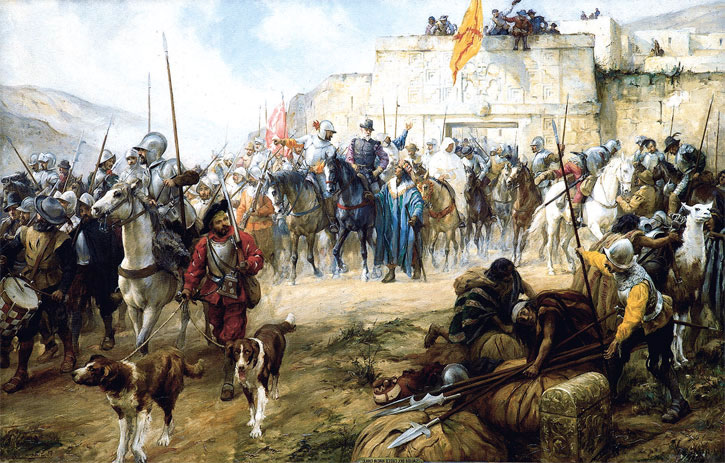Happy Birthday, Juana Manuela
I originally meant to post this a bit earlier, but well...
Originalmente iba a postear eso hace semanas, pero me traspapelé...
Around 200 years ago, in the (future) Argentinean province of Salta, a girl was born, who, for me, would become one of the most interesting person of her age: Juana Manuela Gorriti. Her precise date of birth is not known - precise record keeping was not a priority in the Civil War-torn provinces of South America. They were in the process of winning their independance from Spain, and years away from forming a state of their own. A letter written by her father suggests she was actually born in 1816, but she liked to say in was in 1818, so let`s believe her :)
Hace unos 200 años, en la (futura) provincia argentina de Salta, nació una niña que, para mí, se convertiría en una de las personas más interesantes de su época: Juana Manuela Gorriti. Desconocemos la fecha exacta de su nacimiento: mantenimiento preciso de registros no era una prioridad en las provincias sudamericanas, desgarradas por una guerra civil. Estaban en el proceso de ganar su independencia de España, y años lejos de formar un estado propio. Una carta escrita por su padre sugiere que en realidad nació en 1816, pero le gustaba decir que era en 1818, así que vamos a creerla :)
It can be really hard to say what was more dramatic: her life or her work as a writer. Daughter and niece of celebrated politians and governors, she went with her parents into exile as a teenager. Later, she married in Bolivia Manuel Isidoro Belzú, an officer who went on to become president of Bolivia after a coup d'etat. Juana Manuela lived at that time in Lima, Peru, where she ran a girls' school and regularly organized literary soireés that became a fixture of Peruvian cultural life. However, when Belzú, who ran a populist government, was killed after another coup, she was the one to recover his body and give him a burial. She spent the last years of her long life (definitely over 70) in Buenos Aires, dedicated to organizing and editing her literary work.
Es realmente difícil decir lo que fue más dramático: su vida o su obra. Hija y sobrina de célebres políticos y gobernadores, se exilió con sus padres cuando era adolescente. Más tarde, se casó en Bolivia con Manuel Isidoro Belzú, un oficial que llegó a ser presidente de Bolivia después de un golpe de estado. Juana Manuela vivió en esa época en Lima, Perú, donde dirigía una escuela para niñas y regularmente organizaba veladas literarias que se convirtieron en un hito de la vida cultural peruana. Sin embargo, cuando Belzú, quien dirigía un gobierno populista, fue asesinado luego de otro golpe,fue ella quien recuperó su cuerpo y le dio un entierro. Pasó los últimos años de su larga (definitivamente más de 70 años) vida en Buenos Aires, dedicada a organizar y editar su obra literaria.
And this is quite varied. She was one of the first in Latin America to write horror, or Gothic novels, to write about the countryside and its inhabitants, to study and value the local, not the imported from Europe. Her true Americans are the peasants, the gauchos, the indians, the blacks... not the "European" élite of the big cities. And yes, she says Americans, because she is not a nationalist , if anything, she is a "regionalist", her heart is with the Paraguyan victim of war, not with the Argentinian soldiers commiting the massacre.
Y esta obra es bastante variada. Fue una de las primeras en América Latina en escribir novelas de terroro góticas, en escribir sobre el campo y sus habitantes, en estudiar y valorar lo local, no lo importado de Europa. Sus verdaderos americanos son los campesinos, los gauchos, los indios, los negros ... no la élite "europea" de las grandes ciudades. Y sí, dice que los americanos, porque ella no es nacionalista, si es algo, es "regionalista", su corazón está con la víctimas paraguianas de la guerra, no con los soldados argentinos que cometen la masacre.
Later in life, she edited a cookbook, Cocina ecléctica, a step that surprised many contemporaries, who considered cooking beneath an intellectual like her, but it is a fascinating read that tells a lot about society at that time. It contains a mixture of local and international recipes, some dishes are served "with chilli sauce for the Americans and Worcester sauce for the British", there is an "omelette for young girls" (no spices! apparently you have to marry before being allowed to eat chilli or oregano..)
Más tarde en su vida, editó un libro de cocina, Cocina ecléctica, un paso que sorprendió a muchos de sus contemporáneos, que consideraban la cocina indigna para un a intelectual, pero este libro es una lectura fascinante que cuenta mucho sobre la sociedad en ese momento. Contiene una mezcla de recetas locales e internacionales, algunos platos se sirven "con salsa de ají para los criollos y salsa Worcester para los británicos", hay una "tortilla para jovenes" (¡sin especias! Al parecer hay que estar casada para que se permita consumir ají u orégano ..)
Not much of her work is available in English, although some selected fiction is available in translation. In Spanish, there is a new edition of her complete works (picture above).
La imagen de arriba es de una nueva edición de sus obras completas, de La Crujía Ediciones.




No comments:
Post a Comment